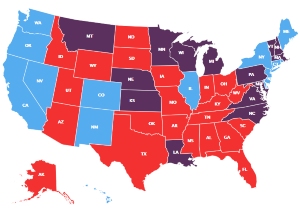 The upset Georgia Senate runoff election victories last week of Democrat Raphael Warnock over Republican Kelly Loeffler and Democrat challenger Jon Ossoff over incumbent Republican David Perdue puts Democrats back in charge of the Senate for the first time since 2014. Julie Norman writes that the victories also highlight the impact of grassroots voter mobilisation efforts by Democrats, while raising questions for Republicans about the electoral limits of aligning with Trump, even before the shadow of the Capitol riot.
The upset Georgia Senate runoff election victories last week of Democrat Raphael Warnock over Republican Kelly Loeffler and Democrat challenger Jon Ossoff over incumbent Republican David Perdue puts Democrats back in charge of the Senate for the first time since 2014. Julie Norman writes that the victories also highlight the impact of grassroots voter mobilisation efforts by Democrats, while raising questions for Republicans about the electoral limits of aligning with Trump, even before the shadow of the Capitol riot.
What happened in the Georgia runoffs?
In dual upsets, Democrat Raphael Warnock defeated Republican Kelly Loeffler, becoming the first Black senator from the state of Georgia, while Democrat Jon Ossoff defeated Republican incumbent David Perdue. The runoffs were held on 5 January after no candidate in either race managed to gain over 50 percent of the vote in the 3 November elections, as required by Georgia law. Turnout for both races shattered previous records with approximately 4.4 million voters casting ballots, and nearly $500 million spent by campaigns and political action groups between November and January.
Why did the runoffs matter?
The runoffs determined which party would control the US Senate, in which Republicans have had a majority since 2014. With a 50-48 advantage, the GOP was on the cusp of maintaining control after the November elections and needed just one additional seat for a majority. Democrats needed to win both of the Georgia seats to tie the chamber; in a 50-50 Senate, the soon to be Vice President, Kamala Harris, will provide the tie-breaking vote, thus giving Democrats the majority.
What does this mean for Biden?
A Democrat majority in the Senate is good news for Biden. The majority party not only has the advantage for simple majority votes on matters such as approving Cabinet picks and judicial appointments, but also controls the various Senate committees, decides which probes and investigations to pursue, and, crucially, decides which bills come to the floor and are put up for a vote. By setting the legislative agenda and helping facilitate the President’s agenda, Senate control will be key in shaping the Biden administration’s trajectory for at least the first two years of his term. With that said, the Senate cloture rule effectively requires 60 votes to pass meaningful legislation, so both Biden and Senate Democrats will be constrained from pursuing a sweeping agenda.

“I’m a Georgia Voter” by Paul Sableman is licensed under CC BY 2.0
What does the outcome mean for Republicans?
Even before the Capitol riot, the Georgia runoffs were an indication of the kind of influence, for better or worse, that outgoing President Donald Trump may have on the GOP in future elections. Trump put both Republican candidates in a tough position by railing against what he called ‘rigged’ elections in Georgia for two months, including in a leaked call to Georgia election officials just days before the runoffs. But both Loeffler and Perdue aligned with Trump, even indicating that they would support Senate challenges to the presidential vote certification (though Loeffler did not object after the Capitol riot). With two unexpected Democratic victories, combined now with the fallout of last week’s events, Republicans will have to grapple with the fact that Trump may be more of a liability than an asset, alienating independents and moderate Republicans, or causing his supporters to boycott the vote by casting doubt on the electoral system.
What does the outcome mean for Democrats?
Following on the heels of Biden flipping Georgia in the presidential race, the Senate upsets reflect changes in the state and in the party. Efforts led largely by former gubernatorial candidate Stacy Abrams increased voter registration by over 500,000 across the state between 2016 and 2020, 25 percent of whom were Black voters, while Democratic turnout in the moderate suburbs of Atlanta proved crucial in both the November and January contests. The efforts underscore for Democrats the dual but challenging imperatives of broadening their base coalition and leaning into community-based, grassroots mobilisation efforts, while also maintaining messaging that appeals to moderates.
Please read our comments policy before commenting.
Note: This article gives the views of the author, and not the position of USAPP– American Politics and Policy, nor of the London School of Economics.
Shortened URL for this post: https://bit.ly/2XwwRAz
About the author
 Julie Norman – UCL
Julie Norman – UCL
Dr Julie Norman (@DrJulieNorman2) is a Lecturer in the Department of Political Science at University College London (UCL), and a researcher at UCL’s Centre for US Politics (@CUSP_ucl).












